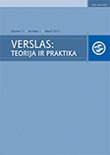Measuring Internal Auditor’s Intention to Blow the Whistle (A Quasi-Experiment of Internal Auditors in the Local Government)
Measuring Internal Auditor’s Intention to Blow the Whistle (A Quasi-Experiment of Internal Auditors in the Local Government)
Author(s): Abdul Hamid Habbe, Syarifuddin Rasyid, Hermita Arif, Iskandar MudaSubject(s): Ethics / Practical Philosophy, Cognitive Psychology, Behaviorism, Accounting - Business Administration, Corruption - Transparency - Anti-Corruption
Published by: Vilnius Gediminas Technical University
Keywords: cognitive moral; Fraud; position; status; prosocial behaviour; cohesiveness; whistleblower;
Summary/Abstract: This study measures the cognitive moral development and tests its interaction with antecedent variables of prosocial behaviour such as fraud level, the status of person committing fraud and cohesiveness in affecting the willingness of internal auditors of local government (APIPs) to be a whistleblower. Quasi-experiment between subject design using pattern of 3×2×2×2 and 2×2 full factorial was employed in this research. The participants involved were internal auditors of 24 local governments in South Sulawesi which were divided into 18 groups. The data were analysed using ANOVA and t-test. The results of this study showed that based on the Cognitive Moral Development (CMD), majority of the internal auditors were categorised as pragmatic, the least number were autonomous, while accommodation was in between of both. Moreover, the intention of APIP to whistleblow was found high though insignificantly different among the three categories of CMD. Similarly, the different was insignificant among the variance of fraud level, the status of person committing fraud, and cohesiveness. The interaction between CMD and treatment variables resulted insignificant figure, except for the interaction between CMD and the fraud level which indicated significant result. Generally, it can be concluded that APIPs have a high intention to blow, but the intention will differ when their CMD interact with the fraud level and cohesiveness.
Journal: Verslas: teorija ir praktika
- Issue Year: 20/2019
- Issue No: 1
- Page Range: 224-233
- Page Count: 10
- Language: English

